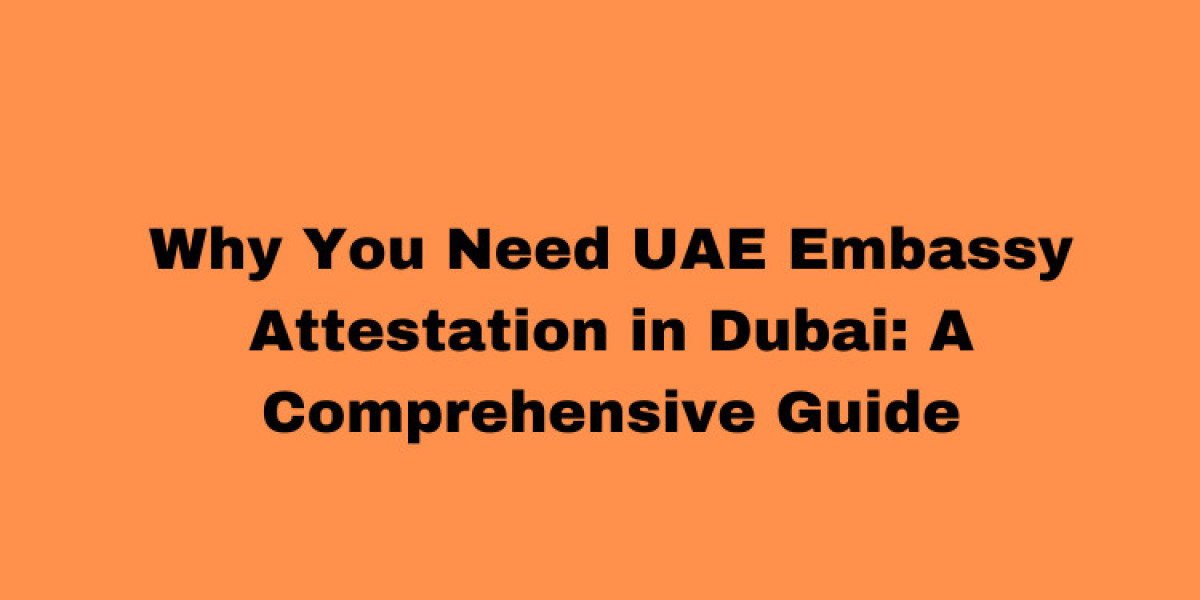The UAE Embassy attestation is a critical process for anyone planning to work, study, do business, or live in Dubai or any other emirate within the UAE. Whether you're an expatriate moving to Dubai, a student seeking to study in one of the country's prestigious institutions, or an entrepreneur setting up a business, UAE Embassy attestation is a vital part of ensuring the legal acceptance of your documents in the UAE.
In this guide, we’ll discuss why you need UAE Embassy attestation, the types of documents that require this process, and the significance it holds for individuals and businesses alike.
What is UAE Embassy Attestation?
UAE Embassy attestation is the process of validating documents issued from a foreign country by the UAE Embassy or Consulate located in that country. This attestation confirms that the documents are genuine, have been verified by relevant authorities in the issuing country, and are recognized by the UAE government.
The UAE Embassy attestation process involves multiple steps, starting with the verification of documents by the respective home country's authorities, followed by attestation by the UAE Embassy. This process is necessary for a wide range of official purposes, from employment and education to legal and commercial matters.
Why Do You Need UAE Embassy Attestation in Dubai?
1. For Employment in Dubai
If you're planning to work in Dubai, especially as an expatriate, your prospective employer will require attested documents such as degree certificates, diplomas, and professional qualifications. Before your work visa can be processed, these documents must be attested by the UAE Embassy in your home country.
The purpose of UAE Embassy attestation is to confirm the authenticity of your educational and professional documents, ensuring that they are valid for use in the UAE. Without this attestation, your employment application could be delayed or even rejected by UAE authorities, making it impossible for you to start working.
2. For Educational Pursuits
Dubai has become a global education hub, attracting students from across the world. Whether you are enrolling in undergraduate, graduate, or professional programs, you will need to submit attested academic documents such as degrees, diplomas, and transcripts.
These documents must first be attested by relevant authorities in your home country, followed by UAE Embassy attestation. This final stamp of approval ensures that the academic institutions in Dubai will recognize your educational qualifications as valid, allowing you to proceed with your admission and studies.
3. For Family Visa Applications
Many expatriates working in Dubai bring their families to live with them. If you plan to sponsor your spouse, children, or other dependents, you’ll need to submit attested personal documents such as birth certificates, marriage certificates, and adoption papers.
UAE Embassy attestation is required to confirm the authenticity of these documents, ensuring that they are recognized by the UAE government. Without proper attestation, your family visa application may be delayed or denied, complicating your efforts to bring your family to Dubai.
4. For Legal Matters
If you are dealing with legal issues in Dubai, such as property transfers, court cases, or setting up a power of attorney, your documents must be attested to be recognized in the UAE legal system. Legal documents such as contracts, agreements, and court orders need to be attested by the UAE Embassy in your home country before they can be used in Dubai.
UAE Embassy attestation ensures that your legal documents are considered valid and authentic under UAE law, allowing you to proceed with legal processes without complications.
5. For Setting Up a Business
Dubai is one of the most attractive destinations for entrepreneurs and businesses from around the world. If you’re planning to establish a business in Dubai, you’ll need to present attested commercial documents such as certificates of incorporation, articles of association, and shareholder agreements.
These documents must be attested by the UAE Embassy in your home country to ensure that they are legally recognized by the UAE government. UAE Embassy attestation confirms the legitimacy of your business and allows you to complete the registration process smoothly.
6. For Residency Visa Applications
If you are applying for a long-term residency visa in Dubai, you’ll need to submit various personal and professional documents, such as educational certificates, birth certificates, and marriage certificates. These documents must undergo attestation by the UAE Embassy in your home country to be considered valid.
Without UAE Embassy attestation, your residency visa application may face delays or be rejected, preventing you from legally residing in Dubai.
7. For Medical Purposes
In some cases, UAE Embassy attestation is required for medical purposes. If you’re moving to Dubai for medical treatment or planning to work in the healthcare sector, certain medical documents—such as health certificates and medical licenses—may need to be attested by the UAE Embassy.
This ensures that healthcare institutions and the government in Dubai recognize your documents as valid, allowing you to receive medical treatment or obtain the necessary permits to work in the medical field.
Types of Documents That Require UAE Embassy Attestation
Several types of documents need UAE Embassy attestation before they can be used in Dubai. These include:
Educational Documents
- Degree certificates
- Diplomas
- School leaving certificates
- Professional certifications
Personal Documents
- Birth certificates
- Marriage certificates
- Divorce decrees
- Death certificates
- Police clearance certificates
Commercial Documents
- Power of attorney
- Memorandum of association
- Articles of incorporation
- Shareholder agreements
Medical Documents
- Medical reports
- Health certificates
- Medical licenses
The UAE Embassy Attestation Process
The process of UAE Embassy attestation typically involves several steps. Here’s a breakdown of the process:
Initial Attestation in the Home Country: The document must first be attested by local authorities in the country where it was issued. For example, an educational certificate must be attested by the issuing university, a notary public, and the Ministry of Education or Ministry of External Affairs in your home country.
UAE Embassy or Consulate Attestation: Once the document has been attested by the appropriate authorities in your home country, it must be submitted to the UAE Embassy or Consulate for attestation. The UAE Embassy will verify the authenticity of the document and provide the final attestation.
MOFA Attestation in Dubai: After arriving in Dubai, the attested document must be submitted to the Ministry of Foreign Affairs (MOFA) for final verification. This step ensures that the document is officially recognized by the UAE government.
Conclusion
UAE Embassy attestation is a crucial process for anyone who wants to live, work, study, or conduct business in Dubai. Whether you’re applying for a job, enrolling in a university, setting up a business, or sponsoring your family’s residency, UAE Embassy attestation ensures that your documents are legally valid and recognized by the UAE government.
Without proper attestation, your documents may not be accepted by UAE authorities, leading to delays, rejections, and complications in your plans. By completing the UAE Embassy attestation process, you can ensure that your personal, professional, and legal documents are ready for use in Dubai, allowing you to enjoy a smooth and hassle-free experience in the city
Contact US
Name - SEPL- Certificate Attestation Services in Dubai MOFA Apostille Documents Degree, Marriage Birth in UAE
Address: Sharaf DG Metro Station - 101 First Floor Khalid Bin Al Waleed Building Khalid Bin Al Waleed Road شارع خالد بن الوليد - Exit 3 - Dubai
Phone: +971502447519
Email - dubai@seplgroup.com
More Services
Certificate Attestation services in dubai
Documents Attesttaion services in dubai
Uae Embassy Attesttaion in dubai
marriage Certificate Attestation in dubai
MOFA Attestation in Dubai








